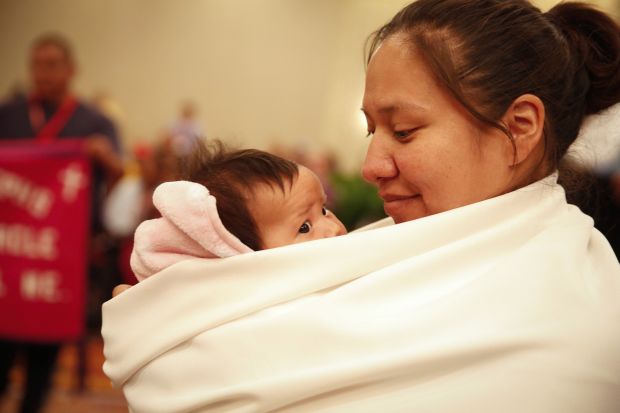FARGO, N.D. (CNS) — The bishop of Fargo urged Native American Catholics to continue to look to the “unknown maiden in the wilderness” as their role model in walking humbly with God.
Bishop John T. Folda addressed the Tekakwitha Conference in Fargo in a homily during Mass July 25, the feast of St. James.
“St. James and the other apostles were humble fisherman. … Nobodies,” said Bishop Folda. “But Jesus saw something more in them.”
And by her Christian witness, St. Kateri Tekakwitha, “an unknown maiden in the wilderness,” has “uplifted the native peoples of this continent” and has shown the way to walk humbly, he said.
“To walk humbly,” was the theme of the 75th anniversary gathering of the Tekakwitha Conference as it met July 23-27 in Fargo, the city where it was born. The meeting drew 750 people — Native Americans and others who work with them in ministry.
In his homily, Bishop Folda related St. Kateri’s story of perseverance.
“Kateri’s journey wasn’t easy,” he said. “She endured fierce opposition and ridicule from those she knew … even from members of her family.”
Kateri Tekakwitha was born to a Mohawk father and Algonquin mother in 1656 in upstate New York. She was orphaned at age 4 during a smallpox epidemic that left her pockmarked and nearly blind. After hearing the stories of Jesus from missionaries, Kateri embraced Christianity and following her baptism some in her tribe turned on her. She fled to a Mohawk Catholic mission in Quebec.
“She became a model of charitable service to those around her,” Bishop Folda said of her devotion to children, the elderly and the sick in her community.
“To walk humbly is in many ways to be a servant to all,” he said, adding that it is not the same as servitude or weakness. “It’s a manifestation of the strength and grace that God has given us.”
Bishop Folda was among 15 U.S. bishops attending the Tekakwitha Conference. Many of them took part in a two-day conversation ahead of the annual conference. He said that meeting, facilitated by the U.S. Conference of Catholic Bishops and the Washington-based Black and Indian Mission Office, focused on the needs of Catholic Native Americans and their communities.
PREVIOUS: Native American Catholics gather to pray, reflect, recharge their faith
NEXT: Speaker sees current attacks on Catholic Church as centered on women




Share this story